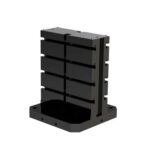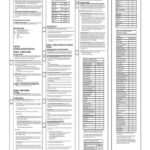The Importance of PCB Contract Manufacturing Services
PCB contract manufacturing services play a crucial role in the electronics industry. They enable companies to:
- Reduce costs by leveraging the economies of scale and expertise of specialized manufacturers
- Accelerate time-to-market by utilizing the manufacturing capabilities and capacity of contract manufacturers
- Ensure product quality and reliability through the use of state-of-the-art equipment and processes
- Access advanced technologies and materials that may not be available in-house
- Scale production up or down based on demand, without significant capital investment
The PCB Contract Manufacturing Process
The PCB contract manufacturing process typically involves the following stages:
-
Design and Engineering: The client provides the PCB design files, specifications, and requirements to the contract manufacturer. The manufacturer’s engineering team reviews the design for manufacturability and provides feedback or suggestions for improvement.
-
Prototyping: The contract manufacturer fabricates a small batch of prototypes for testing and validation. This stage allows the client to verify the functionality and performance of the PCB before mass production.
-
PCB Fabrication: Once the design is finalized, the contract manufacturer begins the PCB fabrication process. This involves creating the copper traces, drilling holes, applying solder mask, and adding silkscreen markings on the PCB substrate.
-
PCB Assembly: After fabrication, the PCBs are populated with electronic components using either through-hole or surface-mount technology (SMT). The contract manufacturer may also perform additional processes such as conformal coating, potting, or encapsulation.
-
Testing and Inspection: The assembled PCBs undergo rigorous testing and inspection to ensure they meet the client’s specifications and quality standards. This may include automated optical inspection (AOI), X-ray inspection, functional testing, and burn-in testing.
-
Packaging and Shipping: The finished PCBs are packaged according to the client’s requirements and shipped to the designated location.
Choosing the Right PCB Contract Manufacturer
Selecting the right PCB contract manufacturer is crucial for the success of your project. Here are some factors to consider:
-
Technical Capabilities: Ensure that the manufacturer has the necessary equipment, processes, and expertise to fabricate and assemble your specific type of PCB.
-
Quality Management: Look for a manufacturer with a robust quality management system, such as ISO 9001 certification, and a track record of producing high-quality PCBs.
-
Industry Experience: Choose a manufacturer with experience in your industry or application, as they will be better equipped to understand your requirements and provide value-added services.
-
Capacity and Scalability: Ensure that the manufacturer has the capacity to meet your current and future production needs, and can scale up or down as required.
-
Communication and Support: Select a manufacturer that provides clear communication, responsive support, and a dedicated account manager to ensure a smooth and successful partnership.

Types of PCB Contract Manufacturing Services
pcb contract manufacturers offer a range of services to meet the diverse needs of their clients. These services can be categorized as follows:
-
turnkey pcb Assembly: The contract manufacturer handles the entire PCB production process, from sourcing components to final assembly and testing. This comprehensive service is ideal for clients who want a one-stop solution for their PCB manufacturing needs.
-
Consignment PCB Assembly: The client supplies the components and the contract manufacturer performs the PCB assembly and testing. This service is suitable for clients who have established relationships with component suppliers or want to maintain control over the component selection process.
-
PCB Fabrication Only: The contract manufacturer fabricates the bare PCBs according to the client’s design files and specifications. This service is appropriate for clients who have in-house assembly capabilities or prefer to outsource assembly to another provider.
-
PCB Design and Engineering Services: Some contract manufacturers offer PCB design and engineering services to help clients optimize their designs for manufacturability, reliability, and cost-effectiveness. These services can be particularly valuable for clients who lack in-house PCB design expertise.
Advanced PCB Manufacturing Technologies
PCB contract manufacturers invest in advanced technologies to meet the evolving demands of the electronics industry. Some of these technologies include:
-
High-Density Interconnect (HDI) PCBs: HDI technology enables the fabrication of PCBs with finer traces, smaller vias, and higher component density. This is essential for miniaturization and high-performance applications.
-
Flexible and Rigid-Flex PCBs: Flexible PCBs are made from thin, flexible substrates that can bend and fold to fit into compact or irregularly shaped spaces. Rigid-flex PCBs combine rigid and flexible sections to provide the benefits of both technologies.
-
Multilayer PCBs: Multilayer PCBs consist of multiple layers of conductive material separated by insulating layers. They offer higher circuit density, improved signal integrity, and better EMI/RFI shielding compared to single or double-layer PCBs.
-
Embedded Components: Some PCB contract manufacturers offer the capability to embed passive components, such as resistors and capacitors, within the PCB substrate. This technique saves space, reduces component count, and improves reliability.
-
3D Printing: Additive manufacturing technologies, such as 3D printing, are being explored for PCB fabrication. These technologies have the potential to enable rapid prototyping, complex geometries, and customized PCB structures.
Benefits of Outsourcing PCB Manufacturing
Outsourcing PCB manufacturing to a contract manufacturer offers several benefits for businesses:
-
Cost Savings: Contract manufacturers have the economies of scale, purchasing power, and operational efficiency to produce PCBs at a lower cost than in-house manufacturing.
-
Faster Time-to-Market: By leveraging the expertise and capacity of a contract manufacturer, businesses can accelerate their product development and launch cycles.
-
Access to Advanced Technologies: Contract manufacturers invest in state-of-the-art equipment and processes that may be too expensive or impractical for businesses to acquire in-house.
-
Improved Quality and Reliability: PCB contract manufacturers have the expertise, quality control systems, and certifications to ensure consistent and reliable PCB production.
-
Flexibility and Scalability: Outsourcing allows businesses to quickly adjust their production volumes based on market demand, without the need for significant capital investment or workforce adjustments.
Challenges and Risks of PCB Contract Manufacturing
While PCB contract manufacturing offers many benefits, there are also some challenges and risks to consider:
-
Intellectual Property Protection: Businesses must ensure that their intellectual property is protected when sharing design files and technical information with a contract manufacturer. Non-disclosure agreements (NDAs) and other legal safeguards should be in place.
-
Communication and Cultural Barriers: Working with a contract manufacturer, especially one located in a different country, can present communication and cultural challenges. Clear communication channels and a shared understanding of expectations are essential for a successful partnership.
-
Supply Chain Disruptions: Outsourcing PCB manufacturing can expose businesses to supply chain risks, such as component shortages, logistics issues, or geopolitical events. Robust supply chain management and risk mitigation strategies are necessary.
-
Quality Control and Oversight: While contract manufacturers are responsible for PCB quality, businesses must still maintain oversight and conduct regular audits to ensure that their quality standards are being met.
The Future of PCB Contract Manufacturing
The PCB contract manufacturing industry is constantly evolving to meet the changing needs of the electronics industry. Some trends and developments that are shaping the future of PCB contract manufacturing include:
-
Miniaturization and High-Density PCBs: As electronic devices become smaller and more complex, there is a growing demand for miniaturized and high-density PCBs. Contract manufacturers are investing in advanced technologies and processes to meet this demand.
-
Sustainable and Eco-Friendly Practices: There is an increasing focus on sustainable and eco-friendly PCB manufacturing practices, such as the use of lead-free materials, waste reduction, and energy-efficient processes. Contract manufacturers that adopt these practices will have a competitive advantage.
-
Automation and Industry 4.0: The integration of automation, robotics, and data analytics in PCB manufacturing is expected to increase efficiency, reduce costs, and improve quality. Contract manufacturers that embrace Industry 4.0 technologies will be better positioned to meet the demands of the future.
-
Regional Diversification: The COVID-19 pandemic has highlighted the risks of relying on a single geographic region for PCB manufacturing. Many businesses are exploring regional diversification strategies to mitigate supply chain risks and ensure business continuity.
Frequently Asked Questions (FAQ)
-
What is the difference between PCB fabrication and assembly?
PCB fabrication refers to the process of creating the bare PCB substrate, while PCB assembly involves populating the fabricated PCB with electronic components. -
How long does it take to manufacture a PCB?
The lead time for PCB manufacturing depends on various factors, such as the complexity of the design, the volume of the order, and the manufacturing capabilities of the contract manufacturer. Typical lead times range from a few days for simple prototypes to several weeks for large-scale production runs. -
What information do I need to provide to a PCB contract manufacturer?
To get started with a PCB contract manufacturer, you will typically need to provide the following information: - PCB design files (Gerber files, schematics, BOM)
- Technical specifications and requirements
- Material and finish preferences
- Testing and quality control requirements
-
Packaging and shipping instructions
-
How can I ensure the quality of my PCBs when working with a contract manufacturer?
To ensure the quality of your PCBs, you should: - Choose a contract manufacturer with a robust quality management system and relevant certifications (e.g., ISO 9001, IPC)
- Clearly communicate your quality requirements and expectations
- Request regular quality reports and conduct periodic audits
-
Establish a quality assurance plan that includes inspections, testing, and acceptance criteria
-
What are the common certifications held by PCB contract manufacturers?
Some common certifications held by PCB contract manufacturers include: - ISO 9001: Quality management system certification
- ISO 14001: Environmental management system certification
- IATF 16949: Quality management system certification for the automotive industry
- AS9100: Quality management system certification for the aerospace industry
- IPC-A-610: Acceptability of electronic assemblies standard
- UL: Safety certification for PCBs and electronic components
Conclusion
PCB contract manufacturing services are essential for businesses that want to bring their electronic products to market quickly, cost-effectively, and with high quality. By outsourcing PCB fabrication and assembly to specialized manufacturers, companies can focus on their core competencies while leveraging the expertise and capabilities of their manufacturing partners.
When selecting a PCB contract manufacturer, it is important to consider factors such as technical capabilities, quality management, industry experience, capacity, and communication. By choosing the right partner and establishing a strong working relationship, businesses can realize the many benefits of PCB contract manufacturing, including cost savings, faster time-to-market, access to advanced technologies, and improved product quality and reliability.
As the electronics industry continues to evolve, PCB contract manufacturers will play an increasingly important role in enabling innovation and meeting the demands of the future. By staying at the forefront of technological advancements, adopting sustainable practices, and embracing automation and regional diversification strategies, PCB contract manufacturers will be well-positioned to support the growth and success of their clients in the years to come.






Leave a Reply